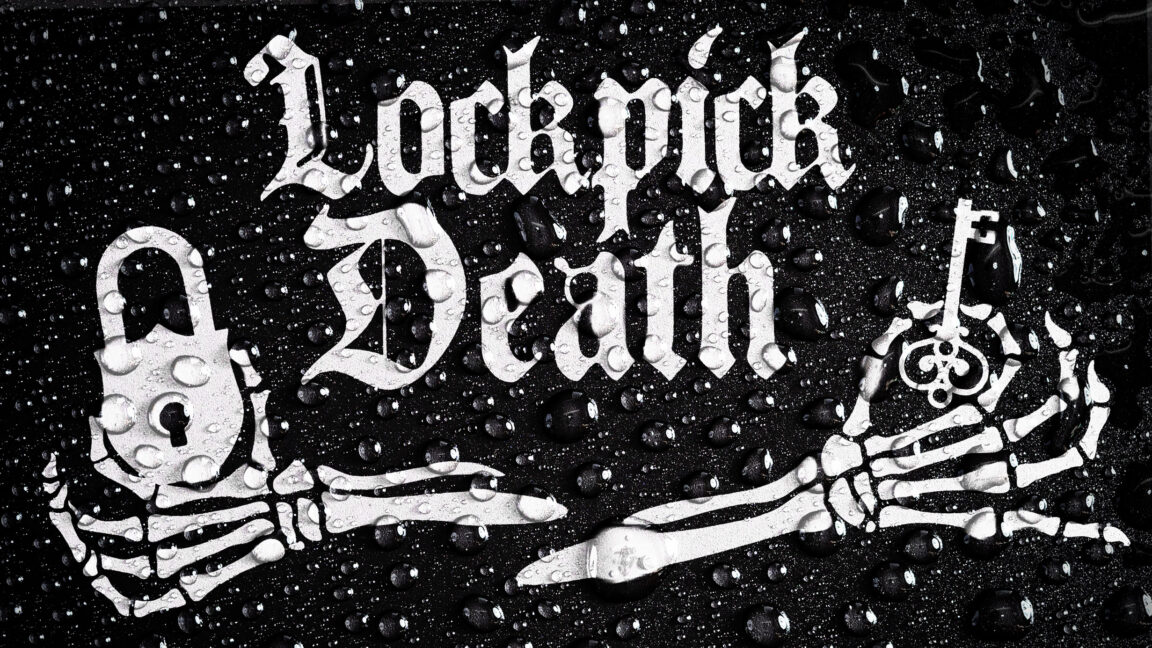It’s still legal to pick locks, even when you swing your legs.
Ok, that was a great read lol.
I sought out the videos, the original (now reinstated after abusive copyright strike): https://www.youtube.com/watch?v=YjzlmKz_MM8
Follow-up with no pre-prep after being called a liar: https://www.youtube.com/watch?v=MbQp5JcQwLA
The follow up is hilarious because he showed everyone else how to do it. The guy who sold the locks shouldn’t have pushed him.
Coming up on 19 million views, too.
That’s not nearly as easy as I thought just from reading the article, since you have to cut the can in a specific way. But like a company hiring a hacker to improve their digital security, they should have used his videos to improve their lock design.
"Sucks to see how many people take everything they see online for face value,” one Proven employee wrote. “Sounds like a bunch of liberals lol.”
On May 1, Proven filed a federal lawsuit against McNally in the Middle District of Florida, charging him with a huge array of offenses: (1) copyright infringement, (2) defamation by implication, (3) false advertising, (4) violating the Florida Deceptive and Unfair Trade Practices Act, (5) tortious interference with business relationships, (6) unjust enrichment, (7) civil conspiracy, and (8) trade libel. Remarkably, the claims stemmed from a video that all sides admit was accurate and in which McNally himself said nothing.
Company wants to shut down negative reviews of their shitty product by gaslighting the public and intimidating his family.
Sounds like a bunch of fascists.
(My bold throughout.)
Copyright infringement
This must be for using their video in his video. https://www.copyright.gov/title17/92chap1.html#107
[T]he fair use of a copyrighted work, including such use by reproduction in copies or phonorecords or by any other means specified by that section, for purposes such as criticism, comment, news reporting, teaching (including multiple copies for classroom use), scholarship, or research, is not an infringement of copyright.
Defamation by implication
https://dictionary.nolo.com/defamation-by-implication.html
An injury to reputation that’s caused when literally true factual statements create a false impression. While the elements of defamation by implication vary from state to state, in general, it requires proof that the speaker:
- published true statements in a way that implied something defamatory, or
- implied something defamatory by omitting facts, and
- intended the defamatory implication.
https://www.law.cornell.edu/wex/defamation
To prove prima facie defamation, a plaintiff must show four things: 1) a false statement purporting to be fact; 2) publication or communication of that statement to a third person; 3) fault amounting to at least negligence; and 4) damages, or some harm caused to the reputation of the person or entity who is the subject of the statement.
False advertising
https://www.law.cornell.edu/wex/false_advertising
To bring a claim for false advertising, the plaintiff must show:
- The defendant made false or misleading statements as to their own products (or another’s);
- Actual deception occurred, or at least a tendency to deceive a substantial portion of the intended audience;
- The deception is material in that it is likely to influence purchasing decisions;
- The advertised goods travel in interstate commerce; and
- There was a likelihood of injury to the plaintiff.
Violating the Florida Deceptive and Unfair Trade Practices Act
To prove a case of unfair and deceptive trade practices in Florida, a plaintiff must generally show the following elements:
- A deceptive act or unfair practice: The plaintiff must demonstrate that the defendant engaged in a deceptive or unfair act or practice in the conduct of trade or commerce;
- Causation: The plaintiff must show that the deceptive or unfair act caused the plaintiff to suffer some type of harm. This harm can be economic, such as a loss of money or property, or non-economic, such as emotional distress; and
- Actual damages: The plaintiff must prove that they suffered actual damages due to the defendant’s deceptive or unfair act, such as out-of-pocket expenses, lost profits, and other economic losses.
Tortious interference with business relationships
https://feldman.law/news/what-is-tortious-interference-with-a-business-relationship/
Tortious interference with prospective economic advantage occurs when a third party or another individual or entity with outside influence interferes with an informal relationship that could create an expectation of economic advantage. To lodge a claim for interference with prospective economic advantage, the following elements must be proven:
- The business had a relationship with another business or individual.
- An outside (third) party knew this relationship existed.
- The outside party purposefully and by wrongful means disrupted that business relationship.
- The outside party’s interference with the business relationship caused harm.
Improper conduct by an outside party that affects business relationships and/or contractual agreements can include:
…
- Fraud …
- Misrepresentation
Unjust enrichment
https://www.law.cornell.edu/wex/unjust_enrichment
Unjust enrichment occurs when Party A confers a benefit upon Party B without Party A receiving the proper restitution required by law.
Civil conspiracy
https://www.turnpikelaw.com/what-is-civil-conspiracy/
It’s called civil conspiracy, and it happens when there is an agreement amongst people to commit a fraudulent, wrongful or deceitful act, any of which would constitute a business tort. The parties must all know that they are participating in a planned wrongful act.
Trade libel
https://www.gibbonslawalert.com/2023/11/01/is-it-defamation-or-trade-libel/
[T]rade libel requires that the publication be “concerning plaintiff’s business, property or product.” … [T]rade libel always requires proof of actual malice (i.e., that the statement was made with knowledge of falsity or a high degree of awareness of probable falsity), …
Holy fuck, thank you for taking the time!!
I stuck with reference source content above, allow me to put in my own non-lawyer assessments here.
Copyright infringement: This appears to be fair use, because it’s “criticism or comment”.
Defamation by implication: Because all sides admit that the video is accurate, and the content which they are suggesting is defamatory is so short and succinct, I have a hard time believing that it would rise to the level of “defamation”.
False advertising: Plaintiff must show that the defendant made false or misleading statements. All sides admit that the video was accurate. Where is the false or misleading statement? Not to mention that false advertising is normally levied against someone trying to inflate the value of their own product, or deflate the value of a competitor product.
Violating Florida Deceptive … Act: This can be charged in federal court, because it’s a “complement” to the FTC Acts. I don’t see where anything “deceptive or unfair” is alleged, because … all sides admit the video is accurate.
Tortious interference with business relationships: I don’t know what “relationship” they’re relying on here. Informal relationship with customers? Retailers? I’m not seeing any improper conduct here.
Unjust enrichment: This is a “You didn’t pay your bill” or “You didn’t uphold your end of the agreement” kind of thing. I have no idea where they even got this charge from.
Civil conspiracy: This would be the civil court “side” of criminal conspiracy. If someone is convicted of criminal conspiracy, their sentence is a criminal one. Once such a sentence exists, people who have experienced loss because of that criminal conspiracy can file civil suit to collect damages. That’s not what’s going on here, but I also know that one can be not guilty in criminal court while being found liable in civil court for the “same thing”. Here, though, because (wait for it) all sides agree that the video is accurate, I’m not sure what the fraudulent, wrongful, or deceitful act would be, and there’s definitely not the intent to commit a planned wrongful act. No way this sticks.
Trade libel: All parties – you know the drill. The truth cann’t be libelous. And there’s that pesky actual malice thing again.
Feels like a SLAPP suit is the correct response here, because these charges are all utter bollocks.
For a moment, I thought the lockpicker was Lockpicking Lawyer, but it’s someone else.
Proven Industries owner Ron Lee (…) was a triple felon
I’m sure that looks great on a resume
“Sucks to see how many people take everything they see online for face value,” one Proven employee wrote. “Sounds like a bunch of liberals lol.”
This alone explains the entire company, really
Things went on this way for some time, as the judge wondered, “Did the plaintiff bring a lock and a beer can?” (The plaintiff did not.) She appeared to be quite disappointed when it was clear there would be no live shimming demonstration in the courtroom.
Under questioning, however, one of Proven’s employees admitted that he had been able to duplicate McNally’s technique, leading to the question from McNally’s lawyer: “When you did it yourself, did it occur to you for one moment that maybe the best thing to do, instead of file a lawsuit, was to fix [the lock]?”
LOL
On July 7, the company dismissed the lawsuit against McNally instead.
Proven did a great speedrun of self destruction.
McNally actually works for Covert Instruments, which is run by his friend LPL. So my guess is McNally’s lawyer is no stranger to lock picking either.
Hahaha wow, they self destruct.
Sure would be a shame if there were a bunch of searches for “proven locks fail”, “proven locks alternative”, “proven locks shimmy” etc…
Reading that article was easily the best five minutes of humor I had in several days.
Who are you and how did you get in here?
I’m a locksmith, and I’m a locksmith
Can’t believe I read the entire thing. Big hooha about nothing.
Ah, aside from the racism and death threats to the lock company owner, that’s a funny read. The best part is how it concludes: the company knew how to take mockery in stride with a smart response video.
Just, somehow, the Florida man owner got his feelings hurt and just had to make a mess of things (and later try and seal the records after losing so badly lol).
Good for McNally.







